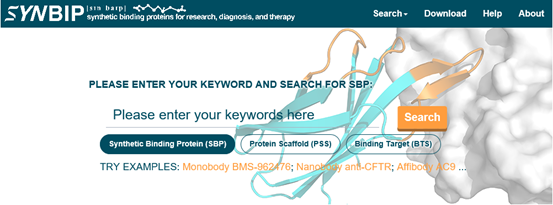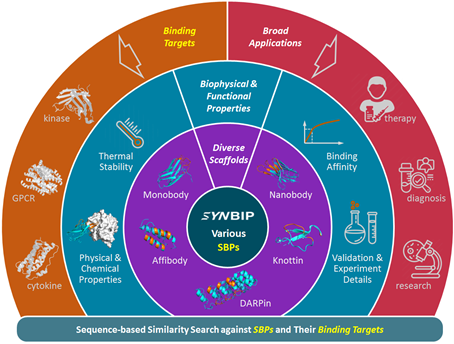In a paper “SYNBIP: synthetic binding proteins for research, diagnosis and therapy” recently published in Nucleic Acids Research, researchers from the School of Pharmaceutical Sciences at Chongqing University (CQU) report a new platform of synthetic binding proteins (SBPs).

The success of protein engineering and design has extensively expanded the protein space, which presents a promising strategy for creating next-generation proteins of diverse functions. Among these proteins, the SBPs are smaller, more stable, less immunogenic, and better of tissue penetration than others, which make the SBP-related data attracting extensive interest from worldwide scientists. However, no database has been constructed yet to systematically describe the SBPs’ information of their scaffold, sequence, structure, biophysical/functional property, and so on. Therefore, a database named ‘SYNthetic BInding Proteins for Research, Diagnosis, and Therapy (SYNBIP)’ was thus introduced. The SYNBIP is accessible without login requirement at both official (https://idrblab.org/synbip/) and mirror (http://synbip.idrblab.net/) sites.

SYNBIP is unique in (a) comprehensively describing thousands of SBPs from the perspectives of scaffolds, biophysical & functional properties, etc.; (b) panoramically illustrating the binding targets & the broad application of each SBP; and (c) enabling a similarity search against the sequences of all SBPs and their binding targets. Since SBP is a human-made protein that has not been found in nature, the discovery of novel SBPs relied heavily on experimental protein engineering and could be greatly facilitated by in-silico studies (such as AI and computational modeling).

The data and analysis tools provided in SYNBIP could lay a solid foundation for the future development of novel SBPs.
Reference:
Xiaona Wang#, Fengcheng Li#, Wenqi Qiu#, Binbin Xu, Yanlin Li, Xichen Lian, Hongyan Yu, Zhao Zhang, Jianxin Wang, Zhaorong Li, Weiwei Xue*, Feng Zhu*. SYNBIP: synthetic binding proteins for research, diagnosis and therapy. Nucleic Acids Res. 2021, doi: 10.1093/nar/gkab926.
https://academic.oup.com/nar/advance-article/doi/10.1093/nar/gkab926/6401895